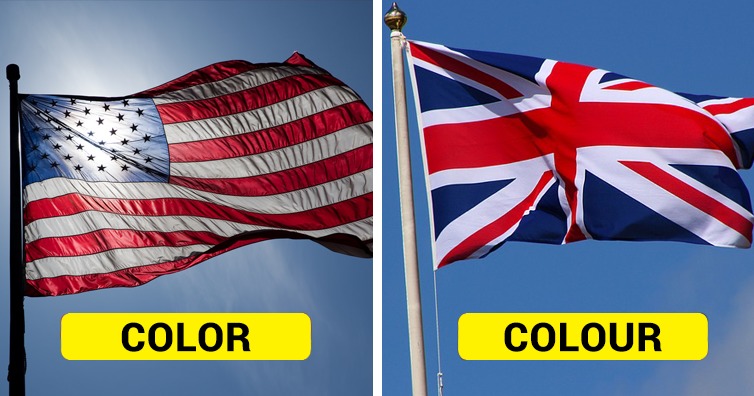Is it color or colour? center or centre? realize or realise? Both are correct but chances are you’ll use a different spelling depending on which side of the Atlantic you’re on. This Modern English drama has been going on for centuries, but have you ever wondered how this separation occur?
Even though we associate American English with the -or word endings, this wasn’t always the case. In fact, before the American revolution, some English lexicographers preferred the -or endings instead of the -our as they wanted to expunge the French “u” – a reminder of the Norman conquest.
In 1755, English writer Samuel Johnson published his masterpiece A Dictionary of the English Language: An Anthology (Get it from Amazon![]() ). Johnson tried to standardize the language as he felt that it was a mess – at the time, American English was indeed a bit of mess as people were spelling words such as “general” as “jinerll”. It was he who brought back the u in -our endings but he also ended up words such as “critick”, “publick” or “chaotick” with a “k” even though this was dropped a few decades later. For almost a century though, English were “ruled” by Samuel Johnson’s guidelines on the language. But then Noah Webster came into play. (the article continues after the ad)
). Johnson tried to standardize the language as he felt that it was a mess – at the time, American English was indeed a bit of mess as people were spelling words such as “general” as “jinerll”. It was he who brought back the u in -our endings but he also ended up words such as “critick”, “publick” or “chaotick” with a “k” even though this was dropped a few decades later. For almost a century though, English were “ruled” by Samuel Johnson’s guidelines on the language. But then Noah Webster came into play. (the article continues after the ad)
NOAH WEBSTER
American teacher, lawyer and lexicographer Noah Webster wanted the new and revolutionary nation to differentiate itself from Britain. He believed that words should be spelled more like they sound as this would have made English easier to teach at school. After a fail attempt in 1806 (he issued A compendious dictionary of the English language![]() which was a critical failure), he went on to issue the 1828 American Dictionary of the English Language. Mostly because the American environment was now more acceptable towards Webster’s spelling
which was a critical failure), he went on to issue the 1828 American Dictionary of the English Language. Mostly because the American environment was now more acceptable towards Webster’s spelling![]() and partly because most of his critics were dead at the time, the dictionary became an instant success and forever changed the English language in the US. This is why “colour” became “color” (he also was quite anti-French), “centre” became “center”, “masque” became “mask”, “offence” was “offense” and “legalise” was turned into “legalize”.
and partly because most of his critics were dead at the time, the dictionary became an instant success and forever changed the English language in the US. This is why “colour” became “color” (he also was quite anti-French), “centre” became “center”, “masque” became “mask”, “offence” was “offense” and “legalise” was turned into “legalize”.
IT’S ALL “AMERICANISMS” TO ME
The British however, did not accept the new spellings as they saw them as “Americanisms”. British newspapers and magazines returned to the old spellings in an effort to stay loyal to “their” English and this is why now Americans and British spell words differently. I guess playwright George Bernard Shaw couldn’t have said it better when he famously stated that “The United States and Great Britain are two countries separated by a common language.”
If you like what you read, then you will definitely love this one: The Surprising Reason Why Americans And British Have Different Accents
Photo: jnn1776 / Flickr, Max Pixel
Photoshop: I’m A Useless Info Junkie
Sources: Americanize, Anglicise: Why Do Brits And Yanks Spell Words Differently? | Why Do Brits and Americans Spell Words Differently? | Why Are British English and American English Different?



